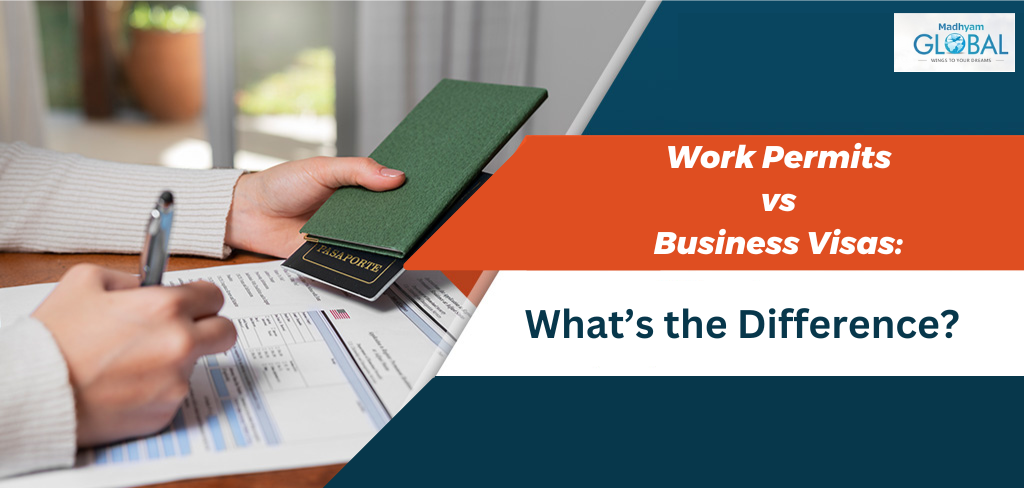Work permits and business visas are both essential travel documents that facilitate legal entry into a foreign country for specific purposes. While they may seem similar, these documents serve distinct functions and cater to different scenarios for international travelers. Employers often utilize them to enable employees to undertake various corporate activities, such as attending conferences, participating in training sessions, networking, or completing work-related projects. However, the permissions and activities allowed under each type of documentation differ significantly. Navigating the work permit application process or understanding business visa benefits is crucial for ensuring compliance with immigration laws and avoiding legal complications.
What is a Business Visa?
A business visa is issued by government authorities to individuals who intend to travel abroad to conduct non-labor business activities. These visas permit travelers to engage in tasks such as attending meetings, participating in conferences, and exploring potential business opportunities or ventures. Business visas are not intended for activities that involve earning an income or providing services classified as labor in the host country.
Activities Permitted on a Business Visa:
- Attending Meetings: A business visa allows holders to participate in formal discussions, negotiations, or strategy sessions without directly contributing to the workforce of the host country.
- Attending Business Events/Conferences: Individuals can attend corporate gatherings, industry seminars, or networking events. These activities are essential for knowledge exchange and building business relationships.
- Exploring Business Opportunities: A business visa enables travelers to investigate potential partnerships, assess market conditions, or evaluate investment opportunities in a foreign country.
It’s important to note that the permissions granted under a business visa can vary depending on the host country. For instance, U.S. business visa holders under the B-1 category may conduct meetings but are restricted from engaging in productive work. Meanwhile, activities like post-sale machinery installation might require a work permit in some countries but not in others.

Duration and Validity of Business Visas:
Business visas are generally short-term and are often valid for durations ranging from 15 to 90 days, depending on the country’s regulations. Some business visas are issued for multiple entries, allowing holders to re-enter the country multiple times within the visa’s validity period. However, these visas are temporary and typically unsuitable for long-term engagements.
What is a Work Permit?
A work permit is a document issued by a government that authorizes foreign nationals to engage in productive work or provide services in the host country. These permits are essential for individuals earning income, working under contracts, or being transferred between affiliated entities in different countries.
Reasons to Apply for a Work Permit:
- Full-Time or Part-Time Employment: A work permit allows individuals to take up employment with a company in the host country, earning a salary or compensation.
- Project-Based Activity: Professionals working on a specific project, such as engineers or consultants, require a work permit to legally perform their duties in the host location.
- Contracted Labor: Independent contractors or freelancers engaged by a local organization may need a work permit to comply with local labor laws.
- Intra-Company Transfers: Employees being relocated from a parent company to a subsidiary or affiliate in another country often require a work permit, facilitated through employer visa sponsorship to ensure legal compliance.
Duration and Application Process:
The validity of work permits varies by country, ranging from six months to several years. The work permit application process is typically more complex and time-consuming than acquiring a business visa. It often involves fulfilling stringent documentation requirements, such as employment contracts, proof of qualifications, and employer sponsorship. Additionally, each country has its interpretation of what constitutes “productive work,” making it essential to consult legal experts during the application process.
Differences in the U.S.
In the United States, the Department of State oversees the issuance of both business visas and work permits. The U.S. business visa, such as the B-1 visa for Business Visitors, allows individuals to visit the U.S. for short-term activities like attending meetings or conferences. However, this visa does not grant permission to engage in gainful employment.

On the other hand, foreign nationals seeking to work in the U.S. need to apply for specific work visas, such as the H-1B (for skilled workers) or L-1 (for intra-company transfers). Each work visa has distinct eligibility criteria based on the type of employment and the applicant’s qualifications.
Key Takeaways:
- Business Visas:
- Allow temporary, non-labor business activities like meetings and conferences.
- Typically valid for 15 to 90 days, with some countries offering multiple entries.
- Not suitable for work that involves income or productive services.
- Work Permits:
- Authorize individuals to engage in paid work or contracted labor.
- Validity ranges from months to years, with longer application processes.
- Required for employment, project-based activities, or intra-company transfers.
By understanding these distinctions, utilizing business visa benefits, and consulting legal teams when necessary, employers and employees can ensure compliance with immigration laws. Streamlining the work permit application process and managing employer visa sponsorship effectively can help optimize international business operations.


